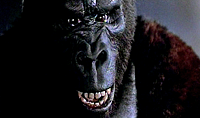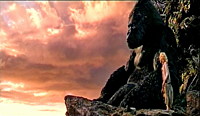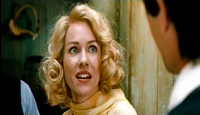The Passion of the Kong
How to Turn a Classic into a Masterpiece
An Appreciation by Barry M. Lamont
Lust and Loneliness
In 1933, with two alpha males competing over a female, the audience couldn't help but wonder exactly what Kong does with the females offered to him, which has led to ribald jokes running for decades, including some in 2005. Lust has always been an undercurrent in films of this genre: monster movie posters of the 50's and 60's invariably showed the creature chasing a half-naked screaming female, or carrying her in its arms. In some movies - all the good Dracula films, for instance, starting with the very first (Nosferatu, 1922) - the sexual element is close to the surface; in other movies, it ceases to be an undercurrent and becomes part of the plot.
Many people are unaware that in both 1933 and 1976, Kong partially undresses the heroine. In 1933 it is fairly innocent (though it still puts the idea in people's minds) - he pulls off her dress, sniffs it curiously, and discards it. In 1976, the native ritual leading up to the offering is explicitly sexual in its implications; and when Kong is stroking Jessica Lange and brushes down the top of her dress, the expression on his face - excellently realized with one of the cable-controlled heads - lets us know that he is fully aware of what he is doing.
In 2005, despite the ability of CGI to depict anything the filmmakers can imagine, the sexual implications completely disappear. We finally get the answer to that question: Kong, half-mad, works himself up into a frenzy and tears the women apart. (We don't see this happen, fortunately, but we do see the bones of his victims strewn around.) This is not a fanciful idea: gorillas deprived of social interaction, like humans in solitary confinement, tend to go mad. Ann is the first person to interact with him on any kind of social level, and it startles him. As their relationship develops, through games, to the rescue from the T Rex's, to their trip to his sanctuary, it is never about desire; it is about his long-unfulfilled need for just one friend.
Having playwright Jack Driscoll as the third point in the triangle sets up this dynamic long before we arrive at Skull Island. Ann is attracted to him before they ever meet - to his mind, to his writing. (The title of the Driscoll play Ann is reading - Isolation - is obviously not an accident.) After their wonderfully awkward first meeting on the ship, they begin to warm to each other on a personal level, but Driscoll is too shy even to spell out to Ann the "subtext" of their relationship, and they have only a single kiss. His subsequent decision to set off alone into the jungle to rescue her, though it is probably the most aggressive thing his character has ever done, is completely devoid of traditional macho swagger; Brody instead shows the quiet determination which has marked his best roles. Even as he rescues Ann, there is no sense that he is directly challenging Kong for dominance; each of them needs her around - and for the same reason, although the civilized, intellectual Jack Driscoll does not appreciate his own loneliness until they are back in New York. It is only then that he challenges Kong face-to-face - again, not to satisfy his own sense of superiority, but to protect others; and it is both fitting and symmetric that their confrontation is abruptly halted by Ann, who reappears and makes a choice.
Many people are unaware that in both 1933 and 1976, Kong partially undresses the heroine. In 1933 it is fairly innocent (though it still puts the idea in people's minds) - he pulls off her dress, sniffs it curiously, and discards it. In 1976, the native ritual leading up to the offering is explicitly sexual in its implications; and when Kong is stroking Jessica Lange and brushes down the top of her dress, the expression on his face - excellently realized with one of the cable-controlled heads - lets us know that he is fully aware of what he is doing.
In 2005, despite the ability of CGI to depict anything the filmmakers can imagine, the sexual implications completely disappear. We finally get the answer to that question: Kong, half-mad, works himself up into a frenzy and tears the women apart. (We don't see this happen, fortunately, but we do see the bones of his victims strewn around.) This is not a fanciful idea: gorillas deprived of social interaction, like humans in solitary confinement, tend to go mad. Ann is the first person to interact with him on any kind of social level, and it startles him. As their relationship develops, through games, to the rescue from the T Rex's, to their trip to his sanctuary, it is never about desire; it is about his long-unfulfilled need for just one friend.
Having playwright Jack Driscoll as the third point in the triangle sets up this dynamic long before we arrive at Skull Island. Ann is attracted to him before they ever meet - to his mind, to his writing. (The title of the Driscoll play Ann is reading - Isolation - is obviously not an accident.) After their wonderfully awkward first meeting on the ship, they begin to warm to each other on a personal level, but Driscoll is too shy even to spell out to Ann the "subtext" of their relationship, and they have only a single kiss. His subsequent decision to set off alone into the jungle to rescue her, though it is probably the most aggressive thing his character has ever done, is completely devoid of traditional macho swagger; Brody instead shows the quiet determination which has marked his best roles. Even as he rescues Ann, there is no sense that he is directly challenging Kong for dominance; each of them needs her around - and for the same reason, although the civilized, intellectual Jack Driscoll does not appreciate his own loneliness until they are back in New York. It is only then that he challenges Kong face-to-face - again, not to satisfy his own sense of superiority, but to protect others; and it is both fitting and symmetric that their confrontation is abruptly halted by Ann, who reappears and makes a choice.


